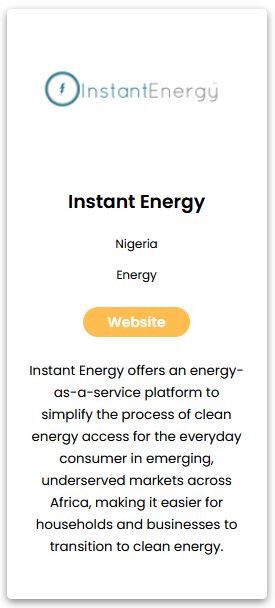"Energy cooperation can contribute to overcoming the challenges faced by the rural population in Africa when it comes to accessing renewable energy."
However, the success of such collaborations depends on equal partnership, involvement of local stakeholders, respect for local cultures and customs, and prioritizing the well-being and interests of rural communities, says Instant Energy's Simisola Sobowale.
Dear Miss Sobowale the last time we spoke you were working as Co-Founder and Chief Operation Manager at Instant Energy. In May this year, you were shortlisted as one of the top 30 finalists for the 30 most promising women-led startups 2023 of the 5th edition of the #FemaleFounderChallenge. Congratulations. How do you feel?
Thank you for recognizing my achievement as one of the top 30 finalists for the 30 most promising women-led startups 2023 of the #FemaleFounderChallenge. I have been further shortlisted as part of the Top 6 and would be pitching on the main stage at the VivaTech event in Paris next month. So exciting!
I am truly honored and excited to have been selected amongst such an impressive group of entrepreneurs. Personally, this recognition has boosted my confidence and reaffirmed my belief in our mission and vision. It serves as a reminder that our work is making a difference and that we are on the right track toward transforming the energy landscape.
Can you tell me something about Instant Energy in a few words?
At Instant Energy, we are driven by a mission to provide affordable and efficient clean energy solutions  to underserved markets. We believe that access to clean energy is a fundamental right and a catalyst for sustainable development. By harnessing the power of AI and data analytics, we are able to offer personalized energy solutions tailored to the specific needs and energy usage patterns of each consumer.
to underserved markets. We believe that access to clean energy is a fundamental right and a catalyst for sustainable development. By harnessing the power of AI and data analytics, we are able to offer personalized energy solutions tailored to the specific needs and energy usage patterns of each consumer.
Moving forward, we remain committed to our goal of simplifying the process of clean energy access for everyday consumers in emerging markets. We will continue to work tirelessly to expand our reach, forge strategic partnerships, and develop innovative solutions that drive the clean energy transition.
We are excited about the opportunities that lie ahead and remain steadfast in our pursuit of building a leading energy-as-a-service platform.
What impact on you and your work could this nomination have?
As the COO of Instant Energy, being nominated as one of the top 6 finalists for the most promising women-led startups 2023 of the #FemaleFounderChallenge has had a significant impact on me and my work. Firstly, it has been an incredible source of motivation and validation for the work we are doing at Instant Energy. This nomination highlights the dedication and effort our team has put into building a sustainable and impactful business in the clean energy sector. The recognition and validation we have received through this achievement not only motivate me personally but also inspire our entire team. It fuels our passion to continue pushing boundaries and driving innovation in the clean energy space.
Professionally, this nomination has opened doors to new opportunities and increased visibility for Instant Energy. It has helped us gain recognition within the industry and among potential partners and investors. The nomination has provided a platform for us to share our story, showcase our expertise, and expand our network.
How is your company doing since our last meeting?
Our efforts in customer acquisition and retention have yielded remarkable results. We have achieved a 30% month-on-month revenue growth, which is a testament to the increasing demand for our clean energy solutions. This growth can be attributed to our commitment to delivering exceptional service, tailored energy solutions, and our focus on customer satisfaction. We have strategically expanded our workforce by bringing on board talented professionals who share our vision and passion for clean energy.
How would you interpret this development?
As we continue to evolve, we have defined our niche in the market. Our focus lies in serving underserved markets across Africa, where access to clean energy is limited. By targeting these markets, we are making a meaningful impact on communities, improving energy access, and contributing to the achievement of the Sustainable Development Goals. And of course in terms of product development fundraising we have made substantial advancements. We have successfully raised some parts of our overall funding target, which has allowed us to scale our operations, invest in technology infrastructure, and expand our market reach. We are grateful for the support and confidence that our investors have shown in our business model and growth potential.
And: We are months away from launching our first-of-its-kind energy-as-a-service platform.
What can I expect from this platform?
It utilizes cutting-edge artificial intelligence and data analytics to provide personalized energy solutions to households and businesses. Our platform allows users to access affordable and efficient clean energy, while also offering real-time monitoring of energy usage and easy bill payment options.
Can you give us an insight into one your projects?
Could big energy cooperations between countries of the African continent and countries outside the continent help the rural population or is it just a win for big companies?
The potential for big energy cooperation between countries of the African continent and countries outside the continent holds significant promise for the rural population and can bring mutual benefits for both the local communities and the participating companies.
Can you explain this?
Big energy cooperations can contribute to addressing the energy access challenges faced by rural populations in Africa. By partnering with countries outside the continent, there is an opportunity to leverage their expertise, resources, and technologies in developing sustainable energy infrastructure. This can lead to the establishment of renewable energy projects such as solar and wind farms, mini-grids, and off-grid solutions, providing clean and reliable electricity to remote areas.
Collaboration between African countries and external energy companies can stimulate economic growth within the rural population. Energy projects often require significant investment, which can create job opportunities and promote local entrepreneurship. The development of renewable energy infrastructure can attract private investments, generate revenue for local communities through energy sales, and foster the growth of ancillary industries. Additionally, increased access to electricity can spur economic activities, facilitate agricultural productivity, support small businesses, and attract further investments in sectors such as healthcare, education, and manufacturing.
Technology Transfer and Knowledge Exchange: Collaborations between big energy cooperations and African countries offer opportunities for technology transfer and knowledge exchange. Companies with advanced expertise and experience can share best practices, technical know-how, and innovative solutions to address specific energy challenges in rural areas. This exchange can enhance local capacity building, empower local communities with the necessary skills, and promote the adoption of sustainable energy practices.
While it is essential to ensure that big energy cooperations are designed with a focus on inclusive and sustainable development, it is not solely a win for big companies. The success of such cooperations depends on fostering equitable partnerships, involving local stakeholders, respecting local cultures and customs, and prioritizing the well-being and interests of rural communities. It is crucial to establish frameworks that promote fair revenue sharing, social and environmental responsibility, and long-term benefits for all involved parties.
Which important cooperations can we find in Nigeria?
Indeed, Nigeria has been engaged in significant energy cooperations that have played a crucial role in advancing the country's energy sector. Let me elaborate on some of the important cooperations in Nigeria:
Nigeria has undergone extensive power sector reforms aimed at attracting private investments and improving the efficiency of the electricity supply. The Nigerian Government has collaborated with international organizations such as the World Bank, the African Development Bank, and the European Union to implement reforms and support the development of the power sector. These cooperations have focused on areas such as policy and regulatory reforms, capacity building, and infrastructure development.
Nigeria recognizes the potential of renewable energy in addressing its energy challenges and reducing its carbon footprint. The country has entered into various partnerships with international organizations, development agencies, and foreign governments to promote the deployment of renewable energy projects. For instance, Nigeria has partnered with the United Nations through some of their sub-organizations such as UNDP, UNIDO, etc. to implement renewable energy initiatives and attract investments in solar, hydro, and biomass energy. Additionally, the Nigerian government has collaborated with the German government through initiatives like the Nigerian Energy Support Programme (NESP), which aims to increase the share of renewable energy in Nigeria's energy mix.
As a major oil-producing country, Nigeria has established cooperations with international oil companies and energy firms to enhance the exploration, production, and distribution of oil and gas resources. Joint ventures and production-sharing agreements have been formed with multinational companies to leverage their expertise and investments in developing Nigeria's oil and gas fields. These partnerships have contributed to technology transfer, knowledge exchange, and increased production capacity in the oil and gas sector.
What about cooperation with other African countries?
Regional Energy Integration: Nigeria is actively engaged in regional energy cooperations within the West African region. One notable example is the West African Power Pool (WAPP), which aims to integrate the power systems of West African countries and facilitate cross-border electricity trade. Nigeria, as the largest economy in the region, plays a vital role in driving this cooperation and fostering regional energy integration. These cooperations in Nigeria demonstrate the country's commitment to advancing its energy sector through strategic partnerships and international collaborations. By leveraging the expertise, resources, and investments of external entities, Nigeria aims to improve its energy infrastructure, expand access to reliable electricity, and promote sustainable energy practices. At Instant Energy, we closely monitor these cooperations and seek opportunities to collaborate with relevant stakeholders in the Nigerian energy landscape. We believe that by forging partnerships and aligning our efforts with the broader energy initiatives in Nigeria, we can contribute to the country's energy transition, support rural electrification, and empower communities with clean and affordable energy solutions.
Last year you gave me a long list of challenges the renewable energy sector is facing in Africa. Did the list grew or shrink in the last 12 months?
During the past 12 months, the renewable energy sector in Africa has seen significant progress and development, which has positively impacted the challenges it faces. While some challenges remain, the collective efforts of Governments, organizations, and stakeholders have contributed to addressing and mitigating these obstacles. Let me provide you with an overview of the changes in the challenges faced by the renewable energy sector in Africa:
Governments across Africa have recognized the importance of creating conducive policy and regulatory environments for renewable energy development. In the past year, several countries have taken significant steps to improve their policy frameworks, streamline regulations, and establish supportive mechanisms such as renewable energy targets with the launch of the Energy Transition Plan (ETP), States across Nigeria being able to independently generate their own electricity and many more. These advancements have helped to reduce the complexity and uncertainty surrounding renewable energy investments.
Access to financing has traditionally been a major challenge for renewable energy projects in Africa. However, in recent years, we have witnessed a growing interest from both local and international financial institutions to invest in clean energy initiatives on the continent. The availability of financing options, including green bonds, impact investment funds, and blended finance mechanisms, has increased, making it easier for renewable energy projects to secure funding.
The lack of adequate infrastructure, including transmission and distribution networks, has been a significant barrier to renewable energy deployment in Africa. Nevertheless, efforts are being made to address this challenge. Several countries have made substantial investments in expanding their grid infrastructure, implementing off-grid solutions, and exploring innovative approaches like mini-grids and decentralized energy systems. These infrastructure developments have facilitated the integration of renewable energy sources into the existing power systems.
Building a skilled workforce to support the renewable energy sector has been an ongoing challenge. However, in the past year, there has been an increased focus on capacity-building and skills-development initiatives. Training programs, vocational courses, and educational partnerships have been established to equip individuals with the necessary technical and managerial skills needed in the renewable energy industry.
Educating the public about the benefits and potential of renewable energy has been a challenge. However, there has been a growing recognition of the importance of raising awareness and engaging local communities in the renewable energy transition. Various campaigns, workshops, and community engagement programs have been launched to promote the understanding and acceptance of renewable energy solutions.
How do you rate the progress?
While progress has been made in addressing these challenges, it is important to note that the renewable energy sector in Africa continues to face certain obstacles. These may include issues related to grid integration, intermittent power supply, land tenure, and political stability. However, the positive strides made in policy, financing, infrastructure, capacity building, and public awareness have contributed to a more favorable environment for renewable energy development. At Instant Energy, we remain committed to overcoming these challenges and leveraging the opportunities in the African renewable energy sector. We believe that by working collaboratively with Governments, organizations, and local communities, we can accelerate the adoption of clean energy solutions, drive sustainable development, and positively impact the lives of people across the continent.


Social Media